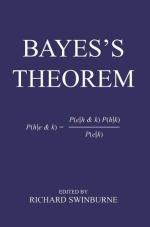|
This section contains 1,134 words (approx. 4 pages at 300 words per page) |

|
In the study of probability, two events A and B are said to be independent events if neither event influences or effects the other. For example, tossing a coin twice yields independent events because whether the coin shows heads or tails on the second toss is not influenced by what it showed on the first toss, or vice versa. Whenever two events, A and B, are independent, we can compute the probability of both A and B happening by simply multiplying the individual probabilities of A and B, i.e., P(A and B)=P(A)P(B), also written as P(AB)=P(A)P(B). The English mathematician Thomas Bayes (1702-1761) considered the situation in which events A and B are not independent. In this situation, the formula for P(AB) is not as simple as in the independent case. It first requires a...
|
This section contains 1,134 words (approx. 4 pages at 300 words per page) |

|


